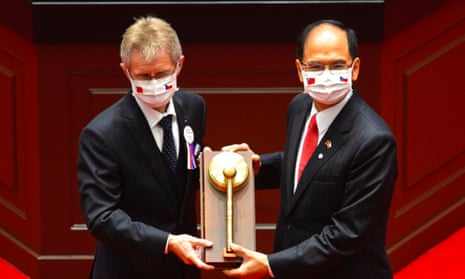China has pledged to take “corresponding measures” over a visit by the Czech parliamentary speaker to Taiwan, where he channelled John F Kennedy to declare to the island’s parliament: “I am Taiwanese.”
The comments by the foreign ministry spokeswoman, Hua Chunying, were reported in state media without details of what such measures would be. They follow other threats from Beijing over countries fostering relationships with Taiwan, and came shortly after the US announced “significant adjustments” to its One China policy in favour of Taiwan.
As China’s relations with numerous countries worsen – in particular the US and Australia – over issues including trade, the pandemic, the South China Sea and the detention of nationals, Taiwan has welcomed international visitors and lobbied for a larger place on the world stage.
This week the Czech parliamentary speaker, Miloš Vystrčil, led a 90-member delegation to Taiwan, where he delivered a speech to the parliament echoing the then-US president’s “Ich bin ein Berliner” 1963 address challenging communism in the Soviet Union.
“Please allow me to use the same method to express support for Taiwan’s people. Allow me to be so humble but also resolute in saying to your country’s parliament that I am Taiwanese,” Vystrčil said.
On Tuesday, Hua said China strongly condemned the trip.
Her comments about “corresponding measures” followed those of Wang Yi, a state councillor, who said the speaker would “pay a heavy price” for his visit. That threat was repeated by a foreign ministry spokesman on Monday, but again without detail.
Vystrčil, a member of the rightwing opposition, did not have the support of his government for the visit, but the reaction from Beijing officials prompted admonishment from the Czechs, who summoned the Chinese ambassador over Wang’s remarks.
“Minister Wang’s statement has crossed the line, such strong words don’t belong in relations between two sovereign countries,” Tomáš Petříček, the Czech foreign minister, said on Twitter.
Taiwan’s government, led by President Tsai Ing-wen, has continued to celebrate the visit, and on Tuesday also welcomed an announcement by the US state department of “significant adjustments” to its One China policy, as the foundation of “continued cooperation”.
In Berlin, at a joint press conference during a visit by Wang, German foreign minister Heiko Maas said the EU stood “shoulder to shoulder” with the Czech government. “Threats are not appropriate.” Maas also expressed concern about the repression of Uighurs in Xinjiang province and about Hong Kong’s security law.
Beijing considers Taiwan to be a territory of the People’s Republic of China under its “one China principle”. Various nations have domestic “One China” policies ranging from recognition and tacit acceptance of the principle to ambiguously worded acknowledgements. Few countries have formal ties with Taiwan.
The state department’s top diplomat for east Asia, David Stilwell, said the US government was establishing a new economic dialogue with Taiwan, which would have “technology at the core”.
The state department also declassified cables from the Reagan era listing six security assurances it gave to Taiwan including no set end date for arms sales and no prior consultation with Beijing over such sales, that the US has not agreed to take a position regarding sovereignty over Taiwan, and will never pressure Taiwan to negotiate with Beijing.
Stilwell said the US had made the “adjustments” because of “the increasing threat posed by Beijing to peace and stability in the region” and targeting of Taiwan through diplomatic isolation, military threats and actions, cyber hacks, economic pressure and interference.
Beijing’s increasing rhetoric over the support for Taiwan from other countries appears to have had little impact other than to further inflame tensions.
Tsai, whom Beijing labels a “separatist”, has overseen the strengthening of numerous relationships with governments she labels as “like-minded” or of having shared values.
The Czech visit came weeks after the US secretary of health, Alex Azar, travelled to Taiwan in the highest level US visit in four decades. Azar met Tsai and spoke critically of China’s response to the pandemic.
Bolstered by recent arms sales from the US, Taiwan has continued to boost its military defences, fearing Chinese attempts to take the island by force – something Beijing has never ruled out.
Additional reporting by Phillip Oltermann in Berlin
